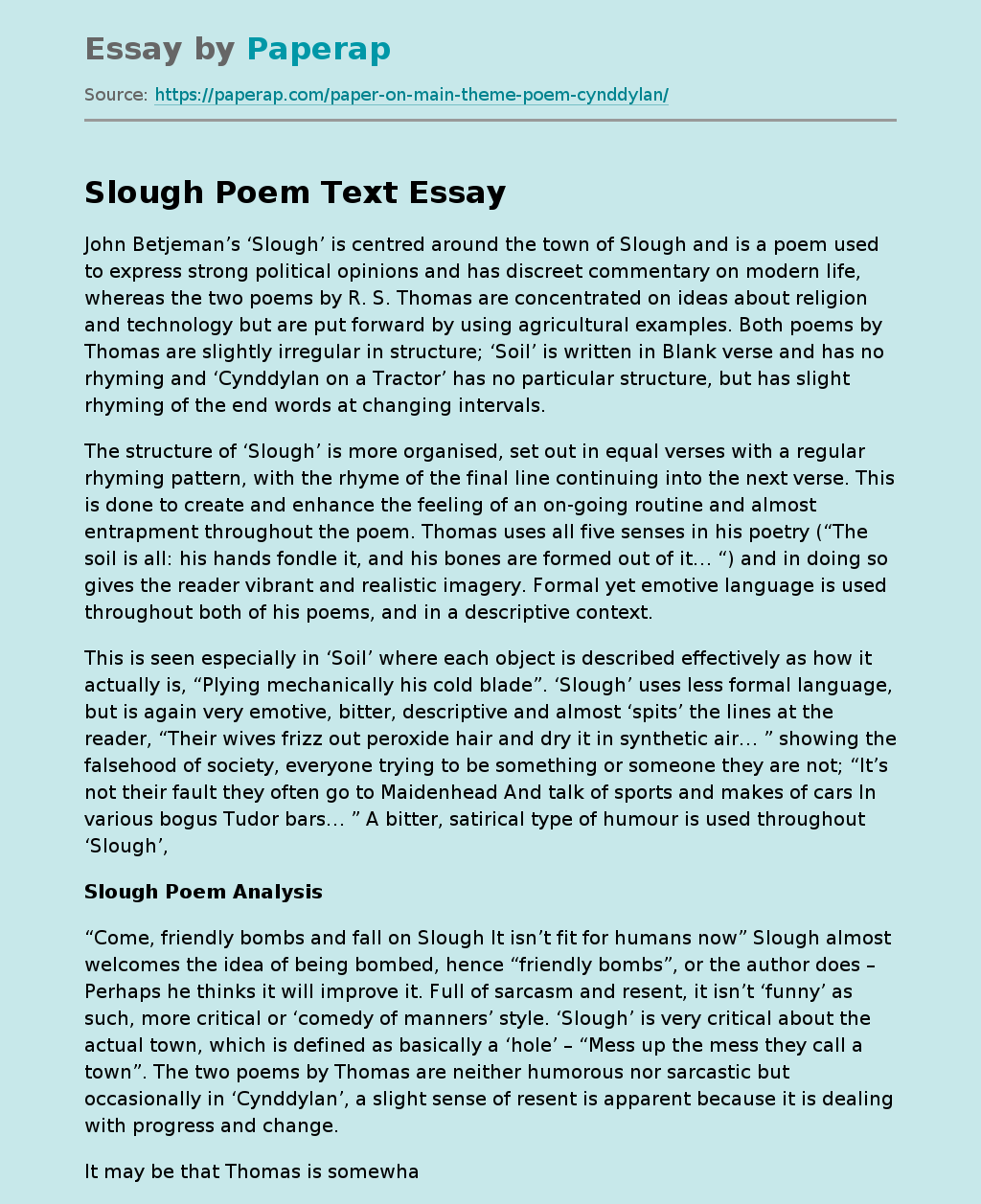John Betjeman’s ‘Slough’ is centred around the town of Slough and is a poem used to express strong political opinions and has discreet commentary on modern life, whereas the two poems by R. S. Thomas are concentrated on ideas about religion and technology but are put forward by using agricultural examples. Both poems by Thomas are slightly irregular in structure; ‘Soil’ is written in Blank verse and has no rhyming and ‘Cynddylan on a Tractor’ has no particular structure, but has slight rhyming of the end words at changing intervals.
The structure of ‘Slough’ is more organised, set out in equal verses with a regular rhyming pattern, with the rhyme of the final line continuing into the next verse. This is done to create and enhance the feeling of an on-going routine and almost entrapment throughout the poem. Thomas uses all five senses in his poetry (“The soil is all: his hands fondle it, and his bones are formed out of it… “) and in doing so gives the reader vibrant and realistic imagery.
Formal yet emotive language is used throughout both of his poems, and in a descriptive context.
This is seen especially in ‘Soil’ where each object is described effectively as how it actually is, “Plying mechanically his cold blade”. ‘Slough’ uses less formal language, but is again very emotive, bitter, descriptive and almost ‘spits’ the lines at the reader, “Their wives frizz out peroxide hair and dry it in synthetic air… ” showing the falsehood of society, everyone trying to be something or someone they are not; “It’s not their fault they often go to Maidenhead And talk of sports and makes of cars In various bogus Tudor bars… ” A bitter, satirical type of humour is used throughout ‘Slough’,
“Come, friendly bombs and fall on Slough It isn’t fit for humans now” Slough almost welcomes the idea of being bombed, hence “friendly bombs”, or the author does – Perhaps he thinks it will improve it.
Full of sarcasm and resent, it isn’t ‘funny’ as such, more critical or ‘comedy of manners’ style. ‘Slough’ is very critical about the actual town, which is defined as basically a ‘hole’ – “Mess up the mess they call a town”. The two poems by Thomas are neither humorous nor sarcastic but occasionally in ‘Cynddylan’, a slight sense of resent is apparent because it is dealing with progress and change.
It may be that Thomas is somewhat unsure about advancing technology and perhaps is afraid of change. Thomas was a reverend in a small farming community in Wales, so any changes such as a member of the village acquiring a tractor would have a big affect on everyone. As he was a religious man, God and parallels from the bible appear in his poetry – especially in ‘Soil’ – as poetry would have been a way of expressing his opinions and views. ‘Slough’ was written around the time of the second world war whereas Thomas’ poems are dated earlier than that.
Although this is the case, there is no ‘generation gap’ between the poems. Of course, apart from the fact that the war referred to in ‘Slough’ had not occurred when ‘Soil’ and ‘Cynddylan’ were written. Again, Thomas was a religious man and this is reflected in his poems, for example, his opinion that man came from the soil and will ultimately return to it is shown with the line “… the blood seeps home to the warm soil from which it came. ” The main theme of the poem ‘Cynddylan’ is progress and it is likely that Thomas felt threatened by this subject.
This may be because he thinks people might neglect their faith when things like technology influence them and that they might prefer the new ‘tractors’ of the world to religion – “He’s a new man now, part of the machine”. Machines such as the tractor do not rely on the things that say, the plants in ‘Soil’ do (mainly the sun) and because of the independence of the machines they are above nature, like God. In ‘Slough’ the author is apparently un-threatened by progress, although he does comment on the possible affects of it; “Tinned fruit, tinned meat, tinned milk, tinned beans, Tinned minds, tinned breath”.
Poem Text Slough Poem Analysis. (2019, Dec 05). Retrieved from https://paperap.com/paper-on-main-theme-poem-cynddylan/

